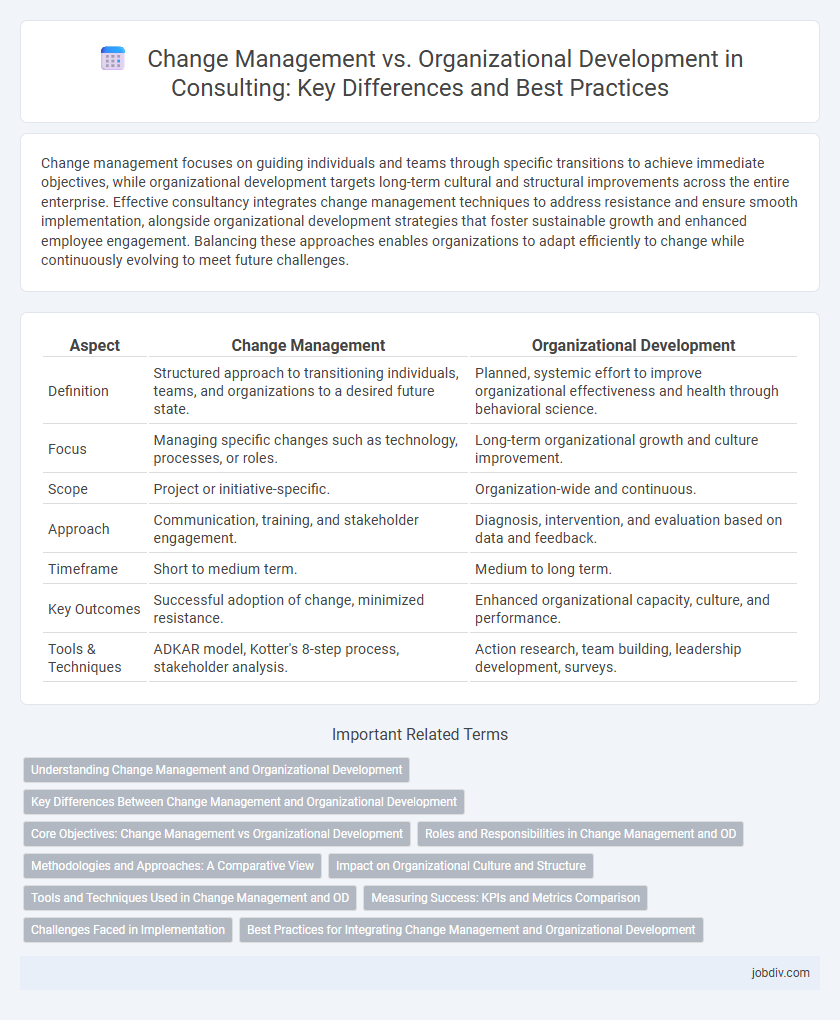Change management focuses on guiding individuals and teams through specific transitions to achieve immediate objectives, while organizational development targets long-term cultural and structural improvements across the entire enterprise. Effective consultancy integrates change management techniques to address resistance and ensure smooth implementation, alongside organizational development strategies that foster sustainable growth and enhanced employee engagement. Balancing these approaches enables organizations to adapt efficiently to change while continuously evolving to meet future challenges.
Table of Comparison
| Aspect | Change Management | Organizational Development |
|---|---|---|
| Definition | Structured approach to transitioning individuals, teams, and organizations to a desired future state. | Planned, systemic effort to improve organizational effectiveness and health through behavioral science. |
| Focus | Managing specific changes such as technology, processes, or roles. | Long-term organizational growth and culture improvement. |
| Scope | Project or initiative-specific. | Organization-wide and continuous. |
| Approach | Communication, training, and stakeholder engagement. | Diagnosis, intervention, and evaluation based on data and feedback. |
| Timeframe | Short to medium term. | Medium to long term. |
| Key Outcomes | Successful adoption of change, minimized resistance. | Enhanced organizational capacity, culture, and performance. |
| Tools & Techniques | ADKAR model, Kotter's 8-step process, stakeholder analysis. | Action research, team building, leadership development, surveys. |
Understanding Change Management and Organizational Development
Understanding Change Management involves guiding individuals and teams through transitions by implementing structured processes to achieve desired business outcomes, focusing on minimizing resistance and ensuring stakeholder engagement. Organizational Development emphasizes enhancing an organization's capacity through strategic interventions aimed at improving culture, effectiveness, and long-term sustainability. Both disciplines are critical for successful transformation, with Change Management concentrating on specific changes and Organizational Development addressing broader systemic improvements.
Key Differences Between Change Management and Organizational Development
Change Management focuses on the structured process of transitioning individuals, teams, and organizations from a current state to a desired future state through defined strategies and communication plans. Organizational Development emphasizes systemic, long-term improvements in organizational effectiveness by enhancing culture, leadership, and processes using behavioral science principles. Key differences lie in Change Management's tactical, project-specific approach versus Organizational Development's holistic, continuous improvement orientation.
Core Objectives: Change Management vs Organizational Development
Change Management focuses on guiding individuals and teams through specific transitions to achieve defined project goals, ensuring minimal disruption and sustained adoption of new processes. Organizational Development aims to enhance the overall health and effectiveness of the organization by fostering culture change, improving communication, and developing leadership capabilities over the long term. Both approaches prioritize growth but differ in scope: Change Management addresses immediate shifts, while Organizational Development targets systemic evolution.
Roles and Responsibilities in Change Management and OD
Change Management roles primarily focus on guiding individuals and teams through transitions by implementing structured processes to manage resistance and communication. Organizational Development responsibilities emphasize long-term strategic initiatives that enhance organizational effectiveness through culture change, leadership development, and continuous learning. Both Change Management and OD require collaboration among change agents, HR professionals, and senior leadership to align people strategies with business goals.
Methodologies and Approaches: A Comparative View
Change Management focuses on structured methodologies like Prosci ADKAR and Kotter's 8-Step Process to guide individual and organizational transitions, emphasizing communication and stakeholder engagement. Organizational Development employs systems-thinking approaches such as Action Research and Appreciative Inquiry to enhance organizational effectiveness through continuous cultural and process improvements. These methodologies differ in scope; Change Management targets specific change initiatives, while Organizational Development aims for holistic long-term transformation.
Impact on Organizational Culture and Structure
Change Management focuses on guiding organizations through specific transitions by minimizing resistance and ensuring employee buy-in, thereby creating short-term adaptations in organizational culture and structure. Organizational Development takes a broader, long-term approach, embedding continuous improvement and learning into the organizational fabric, which fundamentally reshapes culture and structures to align with strategic goals. Both practices impact organizational culture and structure but differ in scope, with Change Management targeting immediate shifts and Organizational Development fostering sustainable transformation.
Tools and Techniques Used in Change Management and OD
Change Management employs tools like stakeholder analysis, communication plans, and change impact assessments to ensure smooth transitions and minimize resistance. Organizational Development utilizes techniques such as action research, team building exercises, and culture assessments to foster long-term organizational effectiveness and employee engagement. Both approaches integrate feedback mechanisms and training programs to support sustainable transformation.
Measuring Success: KPIs and Metrics Comparison
Change Management success is measured using KPIs such as employee adoption rates, resistance levels, and change readiness scores, which provide insights into transition effectiveness and stakeholder engagement. Organizational Development focuses on broader metrics including employee satisfaction, organizational health indices, and productivity improvements, reflecting sustained cultural and structural enhancements. Comparing these metrics reveals that Change Management prioritizes short-term behavioral shifts, while Organizational Development emphasizes long-term systemic growth and adaptability.
Challenges Faced in Implementation
Change management faces challenges such as employee resistance, inadequate communication, and lack of leadership commitment that hinder smooth transitions. Organizational development struggles with aligning cultural values, sustaining long-term engagement, and measuring the impact of interventions across complex systems. Both approaches require strategic frameworks and continuous feedback to overcome barriers and achieve successful implementation outcomes.
Best Practices for Integrating Change Management and Organizational Development
Integrating Change Management and Organizational Development requires aligning strategic objectives with people-centric processes to ensure sustainable transformation. Best practices include fostering leadership commitment, embedding continuous learning, and leveraging data-driven feedback loops to adapt interventions effectively. Combining structured change frameworks with culture-focused development accelerates employee adoption and enhances long-term organizational agility.
Change Management vs Organizational Development Infographic

 jobdiv.com
jobdiv.com